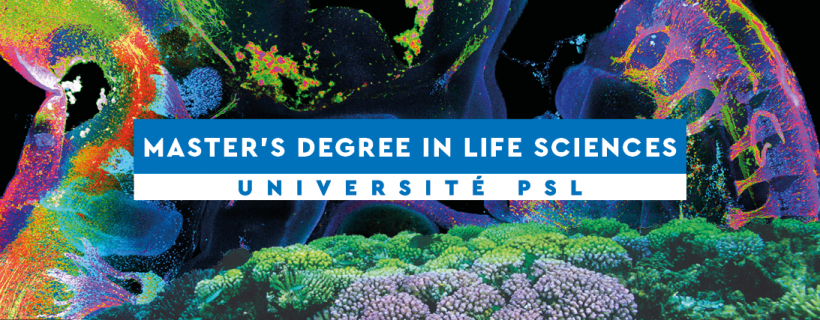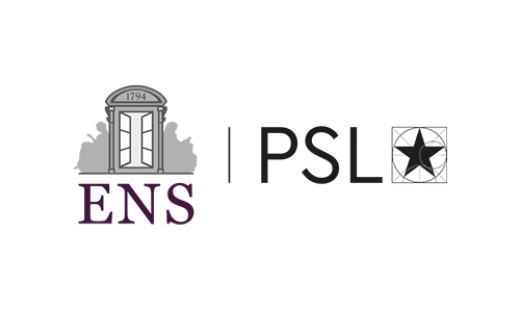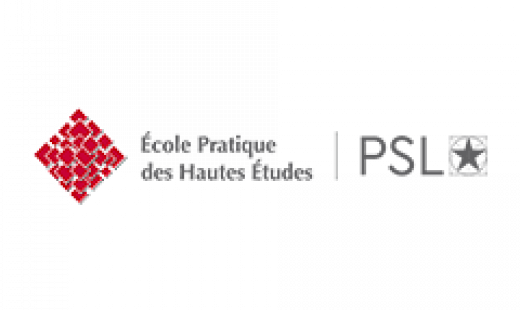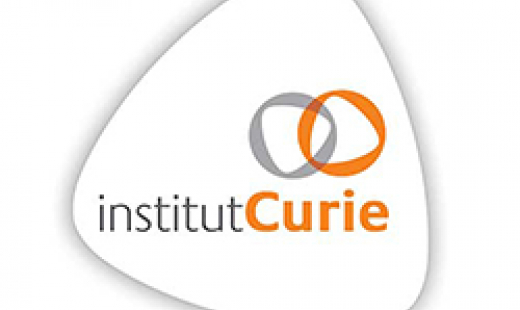Life Sciences

The PSL Master’s in Life Sciences is an interdisciplinary Master’s programme that aims to prepare the next generation of scientists, engineers, and physicians to address emerging problems in contemporary biology, ecology and environmental science.
The Master is developed in partnership by world-renowned schools: Ecole normale supérieure (ENS - PSL), Ecole Pratique des Hautes Etudes (EPHE - PSL), Collège de France, Ecole Supérieure de Physique Chimie Industrielles de la Ville de Paris (ESPCI - PSL), Mines Paris - PSL, Institut de Biologie Physico-Chimique (IBPC), Institut Curie and Institut Pasteur. The recruitment of competitively selected students with an exceptionally high researcher/student ratio, their tailor-made training and close tutoring are shared between the different teaching institutions within PSL. In addition, research training through research practice is an historical mark of these institutions.
Call for applications 2023 | PSL Phd tracks
This master's degree is part of 2 PSL graduate programs: Earth Science and Biodiversity & Life Sciences.
IMaLiS is managed by the department of Biology of the ENS, whereas the two other tracks Integrative PhysioPathology (IPP) and (Biodiversity and Environment, B&E) are managed by the Life and Earth Sciences section of the EPHE and are collectively referred to as IMaGHE (Integrative Master’s for Global Health and Ecology).
> At the M1 level, the Master’s includes three curricula:
- Interdisciplinary Master’s in Life Sciences (IMaLiS)
- Integrative Master’s for Global Health and Ecology (IMaGHE),Integrative physiopathology (IPP curriculum)
- Integrative Master’s for Global Health and Ecology (IMaGHE), Biodiversity and environment (B&E curriculum)
> At the M2 level, while the IMaGHE curricula remain unchanged, IMaLiS further divides into four curricula, also managed by the ENS:
- Systems biology, genomics and bioinformatics
- Neuroscience
- Fundamental biology for health
- Ecology and evolution
At both M1 and M2 levels, limited cross-sampling between the different pathways is possible, provided faculty are in agreement.
IMaLiS aims to nurture both interdisciplinary cross-pollination as well as the development of formalized, quantitative approaches. Most of IMaLiS courses take place in the Department of Biology of the ENS. Learning opportunities within IMaLis are further expanded thanks to close-knit partnerships with several leading French teaching institutions (Université Pierre et Marie Curie, AgroParisTech) and foreign universities (University of Arizona). Within the framework of the PSL Q-Life Institute of Convergence, a scholarship programme offering competitive stipends (10,000 €/year) for students following IMaLiS has been established to support both international students and French students with a degree in a scientific discipline other than biology. For more information see the Q-Life/IMaLiS scholarship programme.
IMaGHE aims at forming scientists involved in environmental or physiological research projects, either applied or academic. Internship opportunities are available within a large network of partners in and around top-ranked universities throughout French territories and abroad.
These structures provide the most appropriate research training by immersing students in a research programme and with their own research topic. Thus, most IMaGHE courses take place at EPHE labs located in Paris, Montpellier, Lyon, Bordeaux, Caen, Dijon, Perpignan, Nancy, Grenoble, Dinard and Moorea (French Polynesia).
Learning outcomes
> IMaLiS is a high-level, generalist course of study in the life sciences that incorporates key interdisciplinary content (including optional training in mathematics, physics, chemistry, geosciences and computer sciences).
In the first year of the IMaLiS programme students are free to select a variety of courses in cellular and developmental biology, medical sciences, genetics, genomics, neurosciences, computational biology, system biology, evolution and ecology. Specific combinations of coursework can be suggested by faculty, for instance to best prepare for the Master 2 specialization, or to best further the student’s individual objectives. In addition, during both years optional training in career skills (foreign languages, scientific communication, statistics, grant-writing, ethics, etc.). Upon successful completion of the first year of the programme, students may matriculate in any of the four specializations offered in the second year of the programme.
In the second year of the IMaLiS programme, students specialize by choosing one of the four curricula listed above.
The programme partners with world-class laboratories for internships (5 months each year) and is highly international in scope, with international recruiting, courses taught in English, and internship opportunities abroad.
> IMaGHE includes two alternative, although interconnected, curricula devoted to life sciences from the molecule to the organism for IPP or from the organism to the environment for B&E. Both curricula address questions about biotic and abiotic interactions affecting the health of living organisms. IMaGHE Master’s 1 and 2 programmes allow early involvement in a research (or R&D) project by backing fundamental learning with the context and practice of the internship.
IMaGHE Master 1 year (first semester) includes a common core providing mandatory training in career skills (foreign languages, scientific communication, statistics, resume- or grant-writing, ethics, etc.) in addition to “commitment” courses preparing for the choice of future teaching units.
Career skills are reinforced in the IMaGHE Master 2 year for languages, environmental law, advanced statistics and preparation to position- or PhD search, for instance.
The Master 2 year provides more specialization with teaching units organized by research seminars. The IPP curriculum offers major courses in “Pathology of the nervous system”, “Infectiology” and “Normal cell, cancer and therapy”. The B&E curriculum specifies concepts inherent in the conservation, evolution, ecosystem services or ecology of coral reefs.
The programme partners for internships (B&E: 2-month minimum fieldwork in M1, 6-month in M2. IPP: 6-month each year) are webbed worldwide. The courses, taught in French are given in different locations, depending on their scientific content.
Curriculum and tracks
The programmes include an M1 year (60 ECTS) and an M2 year (60 ECTS).
IMaLiS
• M1: Core curriculum + one 5-month internship
• M2: 4 available tracks + one 5-month internship
IMaGHE
• M1 : Core curriculum + Specialized options + one 2 to 6-month internship
• M2 : Core curriculum + Specialized options + one 6-month internship
Who should apply?
The IMaLiS M1 year is open to international students with a Bachelor of Science (Life Sciences, Health Sciences, Science and Technology, Earth and Life Sciences, etc.) and from France’s engineering schools, who have demonstrated interest in the Life Sciences.
IMaLiS is also suitable for students who have completed the first two to three years of medical/pharmaceutical studies and who would like additional training in the sciences (see also our Medicine/Science track) before choosing their area of specialization.
IMaGHE M1 year curricula are open to students with a Bachelor of Science, or equivalent, and a research experience through internships or research positions. These curricula are particularly conducive to continuous training.
IMaLiS and IMaGHE M2 year is open to students with a Master 1 degree in Science (Life Sciences, Health Sciences, Science and Technology, Earth and Life Sciences, etc.) or equivalent (minimum 4 years of studies), and to students from French engineering schools who have received basic education in Life Sciences. Selection procedure is separate for each curriculum.
Opportunities
The PSL Master’s in Life Sciences primarily prepares students for careers as researchers, research professors, research physicians or research engineers in the public sector, or as Research and Development professionals in the private sector, particularly the pharmaceutical and innovative biotechnology industries. Career opportunities also exist in management of parks and nature reserves, local authorities, as well as in the private or semi-public sectors in biodiversity or environmental management.
Benefits
• Interdisciplinarity: Solid training in biology, ecology and related fields (mathematics, physics, chemistry, computer science).
• Generalist education with specialization in a cutting-edge field
• Training in research and in innovation through research: Students will complete two internships in academic/industrial research laboratories, private organizations, and/or design offices/regional authorities/nature reserves in France or abroad.
• International exposure: The Master’s offers curricula taught exclusively in English, or in French and English. French language classes are available to international students. International internships benefit from existing networks with partner institutions.
• Expert teaching: The programme is implemented by the best specialists from world-renowned institutions.
• Mentorship: A faculty mentor is assigned to each student to help guide him or her in choosing courses, finding an internship, and preparing a study contract. Students in the Medicine/Science tracks will receive dual mentoring in science and medicine.
• High quality of PSL laboratories
• Access to scholarships (€10,000/year) for specific categories of IMaLiS students.
• Access to pre-professional contracts and eligibility for continuous professional training.
IMaLiS
> MASTER'S DEGREE YEAR 1
The IMaLiS M1 year includes a significant portion of credit hours (UE) devoted to the acquisition of fundamental knowledge in the life sciences along with a choice of more specialized courses.
The M1 year further includes a 5-month internship, most often completed abroad.
See the detail of the Master 1 courses
> MASTER'S DEGREE YEAR 2
In the second year of the Master’s programme, students specialize by choosing one of four curricula:
- Systems biology, genomics and bioinformatics
- Neurosciences
- Fundamental biology for health
- Ecology and evolution
See the detail of the Master 2 courses
The IMaLiS year 2 is also directly accessible to students with a Master 1 degree in Science (Life Sciences, Health Sciences, Science and Technology, Earth and Life Sciences, etc.) or equivalent (minimum 4 years in Science), and to students from French engineering schools who have received basic education in Life Sciences.
The first semester is mainly devoted to courses in one of the aforementioned specializations. Cross-sampling between disciplinary curricula is still possible provided faculty are in agreement.
The second semester is spent completing a 5-month internship with an academic or industry research group, allowing students to further specialize in a specific field.
IMaGHE
Students have to choose one of the two curricula of IMaGHE for their two years of Master’s studies:
- Integrative PhysioPathology
- Biodiversity and Environment
The first semester includes a common core providing mandatory training in career skills (foreign languages, scientific communication, statistics, resume- or grant-writing, ethics, etc.) in addition to more specialized courses. Cross-sampling between disciplinary curricula of the Life Sciences Master or other Masters is possible provided faculty are in agreement.
The M1 year includes a 2-month minimum internship during the second semester for B&E and 6 months alternating with courses throughout the year for PPI within a large network of industry and academic partners in the French territories and abroad. This internship can continue in the same research group during the second year of the Master’s programme to offer the opportunity to conduct a large and specialized project.
In addition to students having validated the first year of the IMaGHE programme, the second year is open to students having successfully completed the first year of a Master’s degree of Science or equivalent (minimum 4 years of studies) and a substantial Research experience through internships or research positions.
Career skills are continued in the Master 2 year for languages, environmental law, advanced statistics and preparation to position- or PhD search, for instance.
The second year of the Master’s programme provides more specialization with teaching units organized by research seminars. The PPI curriculum offers major courses in “Pathology of the nervous system”, “Infectiology” and “Normal cell, cancer and therapy”. The B&E curriculum offers a large coverage of the discipline, but specifies concepts inherent in the conservation, evolution, ecosystem services or ecology of coral reefs. Cross-sampling between disciplinary curricula of the Life Sciences Master or other Master’s programmes is still possible provided faculty are in agreement.
The M2 year also includes a 5- to 6-month internship (B&E: 5- to 6 months during the second semester, IPP: 6 months alternating with courses throughout the year) in an industry or academic research in the French territories and abroad.
Prerequisites
The IMaLiS curricula of the Master’s in Life Sciences are open to students with a Bachelor of Science and basic training in molecular and cellular biology. Applicants can be graduates of or currently enrolled in an engineering school, or can be currently enrolled in medical/pharmaceutical studies, as long as they have completed the first three years.
- Recommended Bachelor’s degrees for applying to the Year 1: Life Sciences, Health Sciences, Science and Technology, Earth and Life Sciences.
- Languages: At least a C1 level in English (reminder: the Master’s programme includes a wide offer of courses in English, including complete curricula).
The IMaGHE curricula are open to students with a Bachelor of Science or equivalent in addition to a research experience through internships or research positions.
Recommended Bachelor’s degrees for applying to the M1 year: Life Sciences, Health Sciences, Science and Technology, Earth and Life Sciences.
These courses are particularly conducive to pre-professional contracts and further education.
2024/25 Admissions process
IMaLiS Master's degree
Online application (Master's Year 1 and Year 2) : January 11 to March 11, 2024 (11.59 pm, CET time) via the PSL application portal.
M1 and M2 applications include the possibility, for eligible candidates, to apply for Master scholarships.
Based on applications, selected candidates will be invited for interviews (remotely) with faculty representatives.
- In preparing your M1 application, please include the following:
- A cover letter explaining your interest in the programme
- A detailed CV, transcripts for the 3 years of your Bachelor’s degree and certificate of successful completion of Bachelor’s (if the degree is still in preparation, transcripts for the ongoing academic year are sufficient at the time of application, a certification will be required at the time of registration)
- Certification of English language proficiency (optional but recommended if English is not your mother tongue). Accepted certifications: TOEFL iBT, CAE, TOEIC, and IELTS
- Two letters of recommendation* (preferably, one from a university professor and one from an internship or project supervisor; alternatively, two academic references)
- ID photo.
- For your M2 application. In addition to the documents, the following are also required:
- M1 transcripts and certification of successful completion (if the M1 degree is still in preparation, transcripts for the ongoing academic year are sufficient at the time of application, a certification will be required at the time of registration)
- Copy of Bachelor’s degree diploma or equivalent.
*PLEASE NOTE: Letters of recommendations need to be provided at the latest by the online application deadline.
IMalis PhD track (in Life sciences or in Earth sciences & biodiversity)
Highly selective and entirely taught in English, PSL PhD tracks are 5-year fully funded programs intended for high-potential students hoping to become top level researchers, in France or abroad. Through its PhD Track Grants, PSL will support outstanding students for the entire duration of their graduate studies, from their Master’s to the completion of their PhD.
- Application procedure based on an application package (to be submitted online from 17 October to 11 December, 2023 via the PSL portal and interview.
Given the very high selectivity of the PhD Tracks, it is strongly recommended that you apply for the Master’s degree (IMaLis) in parallel if you are interested in both programs. More information.
For technical issues with the Application Portal, please contact: support-admissions@psl.eu
IMaGHE
Online Application (Master's degree Year 1 and Year 2) from February 2024 for both tracks (Integrative PhysioPathology / Biodiversity and Environment).
MASTER 1: depending on your profile (nationality, etc.), applications must be submitted on the new French platform "Mon Master" OR via the PSL application portal. Please consult this page to learn about the new modalities and the procedure to follow according to your profile.
MASTER 2: via the PSL application portal for all applicants, French and international.
In preparing your M1 application, please include the following:
A cover letter explaining your interest in the programme, a detailed CV, transcripts for the 3 years of your Bachelor’s degree and certificate of successful completion of Bachelor’s, certification of French and/or English language proficiency (optional), a commitment letter from an academic research group. A recommendation from an internship supervisor would be appreciated (not compulsory) and an ID photo. Some internship proposals are available here
Tuition fees: Fees are set by ministerial decree (env. €243). Please note that you will also need to provide proof of payment for the CVEC (Student Life and Campus Fee) of €100. More information.
Institution for registration: ENS - PSL or EPHE - PSL
Degree issued: French Master’s degree delivered by Université PSL

Contact
Heads of the master's program:
Iris SALECKER (ENS - PSL ; IMaLiS track), Isabelle LAGROYE (EPHE - PSL ; IMaghe track)
admissions-master-sdv@psl.eu
Further information
Find your course
- By degree
- Bachelor's
- Master's
- PhD
- Other
- By discipline
- Anthropology
- Archeology
- Archives – Documentation
- Plastic Arts
- Astrophysics
- Banking - Finance - Insurance
- Chemistry
- Communications - Journalism
- Sustainable development
- Law
- Ecology
- Economics
- Entrepreneurship
- Géographie
- Géographie politique
- Géosciences
- Geosciences
- Business Administration - Management
- History
- Art History
- Digital Humanities
- Computer Science
- Languages
- Literature
- Marketing
- Mathematics
- Mechanics and Materials
- Médecine
- Fashion and design
- Philosophy
- Physics
- Human Resources
- Health - Medecine
- Political Science
- Cognitive science
- Space Science
- Earth sciences
- Engineering Science
- Data Science
- Sciences du climat
- Life Sciences
- Religious sciences
- Social Science
- Sociology
- Drama
- Quantum engineering





